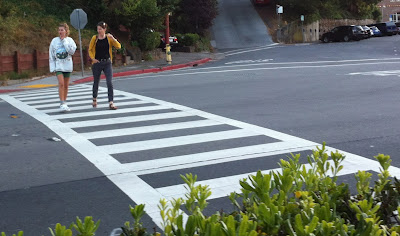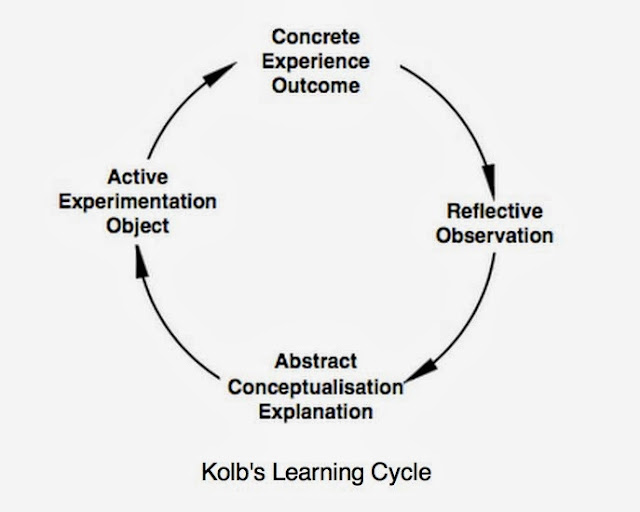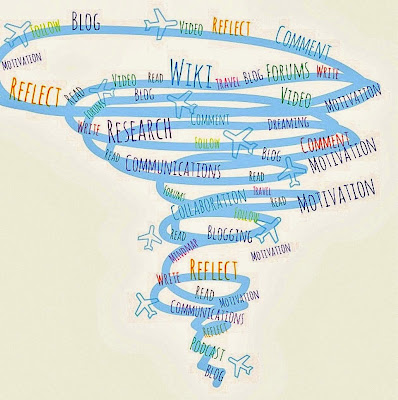"It's as radical as looking at the difference between the roots of a tree and the petals of a flower".
Thanks for the Memory, In Business.
Peter Day Thursday 4th and Sunday 7th September
BBC Radio 4
The power of serendipity.
At 21:33 last night my wife called from a rural train station. Apologising for being 'like my late Mum', she said there was something on the radio that might interest me. And so, 12 hours later I am about to listen to this for the FOURTH time. This isn’t because of its academic value per se, rather for its irritation factor. Going by the online monnica of ‘MindBursts’ for the best part of a decade hints at where my latent, longterm interests lie. What a mess and joy ‘natural’ memory can be; I’m yet to see an algorithm deliver credible serendipity. When did my mother last call me in this way? She died exactly two years ago. It would have to be about three to two and a half years ago and most likely would have been Samuel Pepys dramatised for radio, or the hints then of the content that is now flooding the airwaves on the First World War. Letting that memory fizzle, reform and sink back into my brain. Does this programme trivialise or simply ignore the complexity of the brain? No neuroscientist was interviewed. Shame.
Very often the BBC and Peter Day et al get it right, but here the researchers and writers have got horribly lost, like a kid on their first visit to a fairground they have run about picking up hifhafultiing fag ends, being impressed by trivia, while occasionally calling in an academic or business big hitter. My concentration lapses on each time of listening after 15, then 20, then 25 minutes. The FIFTH and SIXTH listening my start in the middle. What these programme need, regardless of accessibility needs, is a transcript. I could have got this in a couple of sittings by listening to Peter Day while reading the transcript.
There is value in imperfection. There is value in being irritated by a programme. Had this been a lecture I would have had a list of questions at the end, I may even have heckled or muttered my annoyance along the way.
What a hotchpotch.
There are problems of audience, intent, journalist sensationalism, taking such a random and ranging set of examples and setting them as if they warrant or deserve to share the same platform.
It begins with something that would have a live audience listening to a stand-up comic nodding in agreement: our no longer having phone numbers in our head. Why would we try to recall the complex and the trivia, an area code as a name with and three digit number, say Wideopen 3119 (my home phone when I was a kid) is easy; not so easy, especially after repeated additions and alterations are the lengthy and multiple contacts we have today. And what was wrong with the pocket address book in its day? It wasn't a case of remembering a phone number, so much as remembering where we'd put our address book.
Technology is there to manage our memories. Luciano Floridi
"It's as radical as looking at the difference between the roots of a tree and the petals of a flower".
This is the man who should have carried the programme; instead we get a soundbite at the start and another at the end. As bookends his profound thoughts barely tether this piece. Perhaps it just tries far too hard to cover everything in a myriad of ways and ends up trying to catch smoke rings in its fingers?
We hear from:
Evernote: set up six years ago, a series of digital tools to help people remember everything. Research. Communicate. To visually communicate what you mean. Phil Libbin,
Timehop set up by Jonathan Wegener. The idea is to milk what people put into Facebook. He has big financial backers. Timehop replays a day at a time a year ago, ten years ago, drawing from Facebook. He suggests that ‘old is awesome’. Aimed at getting users, not revenue. Will make money ‘when the time is ripe’. I find it dubious and ethically immoral, even inept naive views of how people want the serendipity of forming and reforming their own memories. His game plan can only be to sell to Facebook. I quit Facebook recently and doubt I will ever return. Far, far, far to invasive and exploitative, and for me, distracting and addictive.
d3i, set up by Oliver Waters. He used to keep a ‘journal’ from ten up to university. So what. Millions do and many for far longer, and in a directed way, say keeping minutes of business meetings led to Linkedin. The key, he thinks, is not keeping the diary yourself. WRONG. D3i is dependent on the nonsense and ephemera that people put into Facebook. a) this Facebook dependence is dangerous and limiting b) a fraction of people are digitally literate or even care, or care to use social media very much c) students, by way of example, are shown to distinguish between their social, digital and student academic lives. My tip is to perhaps keep a dialy log, or diary. Perhaps restrict to a learning journal if you are studying. Or write a travel log for a trip. I have great fun looking at a diary I kept just for a French Exchange I did in my teens. Another for a gap year job in the alps for a season.
Memoir. Lee Hoffmann. He suggests there is value in the trivia of social media. Such as sitting with a grandchild and they ask how you met and you show them rather than tell them. This is horrid. Far better to learn to tell stories and learn to listen to the story teller. Snapping away at the trivia of the day. Gross failing to understanding the nature, quality and accruing and sifting quality of storytelling. A few memories as a child of sitting on my grandfather's knees while he talked about the First World War would be reduced to ... her son, watch the video while I go and do something more useful with my time. Poppycock. If you take the human out of memory then it is counterproductive.
Rather
Improve what we have. All text with voice, all voice with transcripts, all video with text and audio grabs …. I’m unconvinced that the commercial operators have much understanding of how memory works. The company they failed to spot is QStream, which in a far more tailored, and valuable way, works with our propensity to forget to aid memory creation in the brain - which is where you need the information if you are to do anything original with it.
The Problem
The need to filter and forget, far better to enhance or support memories that have value, rather than those that do not. So much is missed in this programme. The fundamental background understanding of memory and how and why we forget.
We hear from:
Peter Baron, Google. He's asked to talk about European Court of Justice ‘take down’ law and the legal and social need to forget things like spent court convictions.
European Data Protection Law
Then there's a thing called 'Chronicle of Life'
Facebook and Flickr, so long as they are profitable.
And someone called Milan Chetti, of Chief of Research at HP, Boston Maschatucets.
If I can spell these names correctly I'll find them online, see what the have to say and re-invent this piece for my own understanding of the situation. I ought also to revisit anything I've tagged: life logging, memory, forgetting and so on in here.
All this will take time that I'm prepared to put in to write an article, if not a paper.
One of the profound impacts is that the memorisation process of the human brain has been altered already … constant reliance on mobile devices has hurt our short term memory as mankind, while digitisation of events over time can help recall and improve out long term memory. So short term memory being carried by devices, while long term memory is enhanced. So we forget directions and phone numbers as our devices do this for us, storing contact details and getting us from A to Z and home, while deeper.
Ki Commenenti - Chronicle of Life. To store data forever.
Spelling anyone?
What about life logging, what about problem solving, such as dementia, even assisting at school and in the workplace. The answer is smarter, personalised and mobile and AI.
If it can be done, it will be done.
Luciano Floridi (misspelled on the BBC website) again ...
Innovation, Legislation … but understanding lagging behind
Reshape huge chunks of our lives in ways we haven’t understood.
Floridi uses the metaphor of sediments and layers, a better analogy, as it starts to create in the minds eye a complex environment, though as connected information, digital content changes as associations, reviews, use and comments accrue. I made the connection to Hjulstrom's Curve as I was helping my son get his head around this for A' Level geography last night. I dug out my own Geography text books but found nothing on Hjulstrom. This came from a considered search and selection online. I started to teach my 16 year old son how to do a more academic search online. His approach lacks so much finesse it is shocking. A few minutes of my TLC and we find a brilliant short video from an Irish Geography teacher that put it all so very well.
The programme annoys me because from Peter Day and the BBC you expect a far higher degree of scientific even academic certainty rather than something that is part the One Show for radio. Luciano Floridi of all those we hear from is the one to track down as he does what the very best academics do; they take the complex and try to explain it based on sound research and a depth of experience that few of the others have.
A memory isn’t static, now is it tangible, it is a chemical construct of the moment that the human brain reinvents every time we recall a memory. All that we have experience since that event formed a memory impacts on how we recall it. To preserve an aspect of such an event digitally can never be a ‘memory’ : a photograph of your child’s third birthday doesn’t include the smell of candles and chocolate cake that reminds you of your own eighth birthday, or in my case that my father never attended a single birthday, not my birth, not my 21st … he turned up to say he was leaving. No figuring that. And immediately indicating how a memory is a shifting entity and if you think about it for long enough it is probably very personal.
Just because you can, does not mean it has value. For centuries people have kept diaries, but how many are a Samuel Pepys or an Anne Frank? It is the record of events so much as the interpretation and voice of the author sharing memories and consequences of these events.
My rant not over. This is a subject that fascinates me. 'Mind Bursts' as a thought has been my external blog for seven years and with hints of something on the horizon I bought the dot com last year.
The problem now, compared to ten years ago, is finding amongst millions people to talk to about this. Finding like-minds used to be so, so much easier before the Internet got out of hand and now deluges us with stuff, with too much commercialised and gamified content that gets in the way.
If you listen to the end then perhaps 2020 will be the end - there won't be enough electricity generated in the world to store this digital content anymore. Hopefully it'll all implode, there'll be a massive clear out, and no doubt there'll be a healthy re-invention or return to books and photo albums.
Meanwhile, my memory-support system called this e-learning journal, blog, portfolio thingey offers up the following. The value of these tagged posts is that they are my interpretation of ideas from months or years ago that will trigger an aggregation or assimilation of fresh ideas and thoughts, something that can never occur simply by grabbing new, unknown stuff produced by others on the Interent. It matters that saved content connects with your soul, that intangible part of the brain that nothing digital can ever reach or approach at mimicking.







